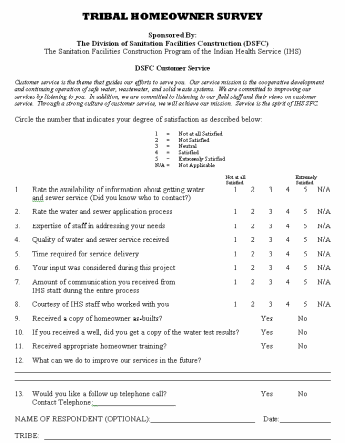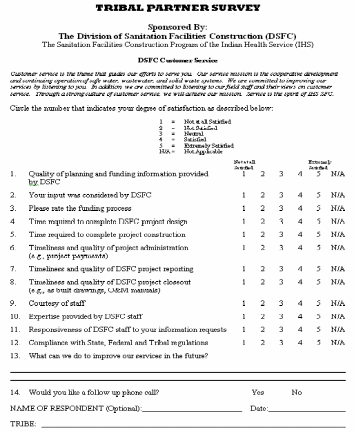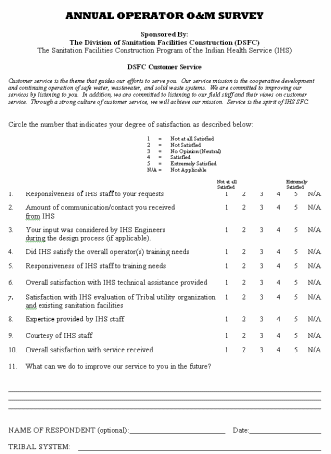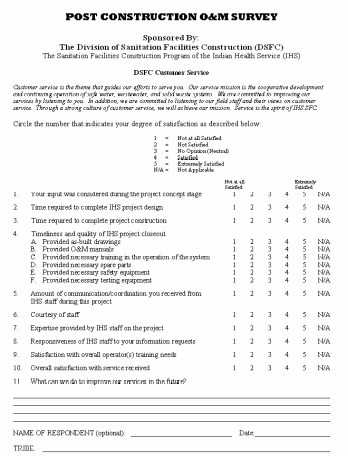OEHE Supporting Statement-revbg 12-01-2009-finalm
OEHE Supporting Statement-revbg 12-01-2009-final.docm
IHS Customer Satisfaction Survey
OMB: 0917-0035
OMB SUPPORTING STATEMENT
Indian Health Service Customer Satisfaction Survey
A. JUSTIFICATION:
1. Circumstances That Make Information Collection Necessary:
This is a request that the Office of Management and Budget (OMB) approve, under the Paperwork Reduction Act, an Indian Health Service (IHS) information collection initiative to conduct customer service surveys in accordance with Executive Order 12862, “Setting Customer Service Standards” (Attachment 1). The Order directs agencies "that provide significant services directly to the public" to "survey customers to determine the kind and quality of services they want and their level of satisfaction with existing services."
The information collected will enable the Sanitation Facilities Construction Program (SFCP) to better:
Deliver the mission of the IHS and SFCP,
Fulfill our responsibilities to provide excellence in government by proactively consulting with those we serve to identify opportunities to improve our information, services, and products to better meet their needs,
Realize the President’s Management Agenda (PMA),
Meet requirements of Executive Order 12862,
Meet requirements of the Government Performance and Results Act (GPRA), and
Meet requirements of the Program Assessment Rating Tool (PART).
2. Purpose and Use of the Information Collection
The IHS goal is to raise the health status of the American Indian and Alaska Native people to the highest possible level by providing comprehensive health care and preventive health services. To support the IHS mission, the SFCP provides technical and financial assistance to American Indian Tribes and Alaska Native villages for cooperative development and continued operation of safe water, wastewater, and solid waste systems and related support facilities.
The IHS Office of Environmental Health and Engineering(OEHE), Sanitation Facilities Construction Branch (SFCB), “Customer Satisfaction Surveys”, will provide the information needed to complete these goals. With the information collected from tribal homeowners, Tribal leaders, and Tribal operation and maintenance operators, the SFCP will make improvements that will result in improved quality of services.
Voluntary customer satisfaction surveys will be conducted through phone calls, mail, and the internet. The information gathered will be used by agency management and staff to identify strengths and weaknesses in current service provision, to plan and redirect resources, to make improvements that are practical and feasible and, to provide vital feedback to partner agencies, Tribal leaders, system operators, health boards, and community members regarding customer satisfaction or dissatisfaction with the SFCP.
Managers and project engineers will use the data to identify:
Service needs of customers,
Strengths and weaknesses of services,
Ideas or suggestions for improvement of services from our customers,
Barriers to achieving customer service standards,
Changes to customer service standards, and
Baselines to measure change in improving service delivery over time.
3. Use Of Improved Information Technology:
As appropriate, automated information technology will be used to collect and process information for these surveys. In many instances, however, the most appropriate methodology will involve written or oral response to a brief questionnaire.
4. Efforts to Identify Duplication and Use of Similar Information:
The SFCB does not currently collect customer service information through phone survey, questionnaires, or automated information technology.
5. Impact on Small Businesses or Other Small Entities:
This information collection will not solicit information from small businesses or other small entities.
6. Consequences of Less Frequent Collection:
Surveys will be conducted only at intervals that are considered appropriate to measure the impact of changes implemented as a result of initial customer satisfaction surveys and to monitor the continued level of performance. Except for the Tribal Homeowner survey which will be conducted once at the end of a project, a survey will likely be conducted on an annual basis after establishment of a baseline. Survey data collection less frequently than annually, would inhibit the ability to monitor changes in service delivery satisfaction.
7. Special Circumstances Requiring to the Guidelines of 5 CFR 1320.5:
The data will be collected in a manner consistent with the guidelines in 5 CFR 1320.5.
Comments in Response to the Federal Register Notice and Outside Consultations:
No comments were received in the Federal Register Notice.
Explanation of Any Payment or Gift to Respondents:
The survey is completely voluntary. No payment or gift will be provided to respondents.
10. Assurance Of Confidentiality to Respondents:
A privacy act notice will be printed on each survey. The SFCP is currently developing a Privacy Act System of Records (PASOR). The only personal information collected will be the respondent’s name, phone number and address. This information is initially collected as part of the Native American homeowner’s application to receive sanitation facilities through the IHS, OEHE, Division of Sanitation Facilities Construction (DSFC). This information is collected to ensure that any noted deficiencies in construction work can be corrected, and is therefore needed to complete this process. These are voluntary surveys and respondents are not obligated to respond.
11. Justification for Sensitive Questions:
Questions of a sensitive nature will not be included in the data collection instrument.
12. Estimates of Annualized Burden Hour, including Annualized Hourly Costs:
Burden hour estimate: The IHS will conduct customer service surveys through each IHS Area SFCP office. The estimated burden hours for respondents is 90 hours per year (12 Areas multiplied by 150 respondent’s multiplied by 3.0 minutes per response equals 90 burden hours). The estimated burden hours for the Federal Government is 300 hours per year (12 Areas multiplied by 150 respondent’s multiplied by 10.0 minutes per response equals 300 burden hours). The collection time for the Federal Government includes completing and collating the instruments and results.
Survey |
Number of Surveys Administered per Year |
Time Burden per Survey (minutes) |
Total Time Burden (hours) |
Tribal Homeowner Survey |
1,200 |
3 |
60 |
Tribal Partner Survey |
200 |
3 |
10 |
Annual Operator O&M Survey |
200 |
3 |
10 |
Post Construction O&M Survey |
200 |
3 |
10 |
Total |
1,800 |
|
90 |
Annualize hourly burden to respondents: There is no cost burden to respondents other than their time to voluntarily complete the data collection instrument. The estimated annualized cost to respondents, as a group, is $900 (90 burden hours multiplied by $10.00 per hour).
Summary of Annualized Burden Hours and Cost - Respondents
|
||||
Survey |
Number of Surveys Administered per Year |
Time Burden per Survey (minutes) |
Total Time Burden (hours) |
Total Cost at $10.00 per hour |
Tribal Homeowner Survey |
1,200 |
3 |
60 |
$600 |
Tribal Partner Survey |
200 |
3 |
10 |
$100 |
Annual Operator O&M Survey |
200 |
3 |
10 |
$100 |
Post Construction O&M Survey |
200 |
3 |
10 |
$100 |
Total |
1,800 |
|
90 |
$900 |
Annualize hourly burden to the Federal Government: The cost burden to the Federal Government is time to complete and collate the data collection instrument and the cost of producing paper copies of the instruments. The instruments will be administered verbally and there will be cost for postage. The estimated annualized cost to the Federal Government is $4,500 (300 burden hours multiplied by $15.00 per hour).
Annualize total cost: The estimated total annualized hourly burden of the surveys is the sum of the burden to the respondents plus the burden to the Federal Government as summarized below and which is $900 for respondents plus $4,500 for the Federal Government which is a total of $5,400.
Summary of Annualized Burden Hours and Cost - Total
|
||||
Survey |
Number of Surveys Administered per Year |
Time Burden per Survey (minutes) |
Total Time Burden (hours) |
Total Cost at $10.00 per hour |
Respondents |
|
|
|
|
Tribal Homeowner Survey |
1,200 |
3 |
60 |
$600 |
Tribal Partner Survey |
200 |
3 |
10 |
$100 |
Annual Operator O&M Survey |
200 |
3 |
10 |
$100 |
Post Construction O&M Survey |
200 |
3 |
10 |
$100 |
|
|
|
|
|
Federal Government |
|
|
|
|
Tribal Homeowner Survey |
1,200 |
10 |
200 |
$3,000 |
Tribal Partner Survey |
200 |
10 |
33.3 |
$500 |
Annual Operator O&M Survey |
200 |
10 |
33.3 |
$500 |
Post Construction O&M Survey |
200 |
10 |
33.3 |
$500 |
Total |
1,800 |
|
390 |
$5,400 |
Estimate of Other Total Annual Cost Burden to Respondents or Record keepers:
There is no capital, operating and/or maintenance costs to respondents or record keepers to report for this collection.
Annualized Cost to the Federal Government:
The estimated total annualized cost to the Federal Government is $4,770 (300 burden hours multiplied by $15.00 per hour and 1,800 paper copies multiplied by $0.15 per copy).
Summary of Annualized Burden Hours and Cost - Federal
|
|||||
Survey |
Number of Surveys Administered per Year |
Time Burden per Survey (minutes) |
Total Time Burden (hours) |
Total Cost at $15.00 per hour |
Cost of the Survey Instrument $0.15/sheet |
Tribal Homeowner Survey |
1,200 |
10 |
200 |
$3,000 |
$180 |
Tribal Partner Survey |
200 |
10 |
33.3 |
$500 |
$30 |
Annual Operator O&M Survey |
200 |
10 |
33.3 |
$500 |
$30 |
Post Construction O&M Survey |
200 |
10 |
33.3 |
$500 |
$30 |
Total |
1,800 |
|
300 |
$4,500 |
$270 |
15. Explanation of Program Changes or Adjustments in Burden:
This is a new information collection.
16. Plans for Tabulations and Publication and Project Time Schedule:
There are no plans for the tabulation or publication of information collected. The data collected will be for internal use only.
Reason(s) Display of OMB Expiration Date is Inappropriate:
The OMB information will be displayed on the data collection instrument accordingly.
Exceptions to Certification for Paperwork Reduction Act Submissions:
No exceptions are being requested.
B. COLLECTION OF INFORMATION EMPLOYING STATISTICAL METHODS:
1. Potential Respondent Universe, Sampling Selection Method, and Expected Response Rates:
The respondent universe will be the customers served through the SFCP, Tribal leaders, and system operators. The 3-minute survey is designed to minimize burden and will be conducted by current staff at each SFCP area office.
2. Information Collection Procedures:
The information collections at each SFCP Area office will be collected in a manner that is consistent with the following principles:
Appropriate sample sizes will be determined for each area to assure that burden is minimized while reliable estimates are produced. In some cases it may be necessary to sample almost all the customers receiving service through a given field office.
Participation will be fully voluntary, and non-participation will have no impact on eligibility for or receipt of future services. If necessary, steps will be taken to ensure unbiased completion of the questionnaires by use of third-party distribution or receipt by a third- party not directly involved in provision of the service being assessed.
Respondent confidentiality will be maintained. Respondents will receive a privacy act notice.
Information collected will be limited to that needed to assess customer satisfaction. Repeated implementation of quantitative surveys will be at an interval appropriate to measure the impact of changes and to monitor ongoing levels of satisfaction.
The questionnaire will be issued/administered a short time (less than two weeks) after the customer has received the service.
Efforts will be made to obtain the highest possible response rates, given the voluntary nature of the data collection efforts. To the extent feasible, efforts will be to assess non-response bias.
3. Methods Used to Maximize Response Rates and Deal with Nonresponse:
Consistent with sound survey methodology, the design of the quantitative survey will include approaches to maximize the response rates, while retaining the voluntary nature of the effort.
4. Tests of Procedures or Methods to be Undertaken:
The data collection instruments have undergone extensive trial and revision to minimize burden and improve their usefulness.
5. Individuals Consulted on Statistical Aspects and Individuals Collecting and/or Analyzing Data:
The SFCP staff developed and designed the customer service survey instruments. In addition, procedures were developed for conducting the survey, including administering the survey, analyzing the information collected and identifying the appropriate staff to administer and analyze the survey at the SFCP Area level.
Patrick Stewart District Engineer, Ft Defiance, AZ Telephone: 928-729-8417 |
Dana Baer Assistant Director, SFCP, Rockville, MD Telephone: 301-443-1345
|
Rob Ziegler, IHI Environmental Consultant, Seattle, WA Telephone: 206-328-6697 |
|
LIST OF ATTACHMENTS
Indian Health Service Customer Satisfaction Survey
Attachment 1: Presidential Executive Order 12862
Attachment 2: IHS Customer Service Survey Instruments and Instructions
Tribal Homeowner Survey
Tribal Partner Survey
Annual Operator O&M Survey
Post Construction O&M Survey
Attachment 3: Federal Register Notice: 60-day Request for Public Comment
Attachment 4: Federal Register Notice: 30-day Request for Public Comment
Indian Health Service Customer Satisfaction Survey
Attachment 1
Presidential Executive Order 12862
Executive Order 12862: Setting Customer Service Standards
Title:Executive Order 12862: Setting Customer Service Stds.
Author: The White House
Date: 11 Sept 1993
Subject: Executive Order of Sept 11, 1993
Setting Customer Service Stds.
THE WHITE HOUSE
Office of the Press Secretary
For Immediate Release
September 11, 1993
EXECUTIVE ORDER
SETTING CUSTOMER SERVICE STANDARDS
Putting people first means ensuring that the Federal Government provides the highest quality service possible to the American people. Public fficials must embark upon a revolution within the Federal Government to change the way it does business. This will require continual reform of the executive branch's management practices and operations to provide service to the public that matches or exceeds the best service available in the private sector.
NOW, THEREFORE, to establish and implement customer service standards to guide the operations of the executive branch, and by the authority vested in me as President by the Constitution and the laws of the United States, it is hereby ordered:
Section 1. Customer Service Standards.
In order to carry out the principles of the National Performance Review, the Federal Government must be customer-driven. The standard of quality for services provided to the public shall be: Customer service equal to the best in business. For the purposes of this order, "customer" shall mean an individual or entity who is directly served by a department or agency. "Best in business" shall mean the highest quality of service delivered to customers by private organizations
providing a comparable or analogous service. All executive departments and agencies (hereinafter referred to collectively as
"agency" or "agencies") that provide significant services directly to the public shall provide those services in a manner that seeks to meet the customer service standard established herein and shall take the following actions:
identify the customers who are, or should be, served by the agency;
survey customers to determine the kind and quality of services they want and their level of satisfaction with existing services;
post service standards and measure results against them;
benchmark customer service performance against the best in business;
survey front-line employees on barriers to, and ideas for, matching the best in business; provide customers with choices in both the sources of service and the means of delivery; make information, services, and complaint systems easily accessible; and provide means to address customer complaints.
Sec. 2. Report on Customer Service Surveys.
By March 8, 1994, each agency subject to this order shall report on its customer surveys to the President. As information about customer satisfaction becomes available, each agency shall use that information in judging the performance of agency management and in making resource allocations.
Sec. 3. Customer Service Plans. By September 8, 1994, each agency subject to this order shall publish a customer service plan that can be readily understood by its customers. The plan shall include customer service standards and describe future plans for customer surveys. It also shall identify the private and public sector standards that the agency used to benchmark its performance against the best in business. In connection with the plan, each agency is encouraged to provide training resources for programs needed by employees who directly serve customers and by managers making use of customer survey information to promote the principles and objectives contained herein.
Sec. 4. Independent Agencies. Independent agencies are requested to adhere to this order.
Sec. 5. Judicial Review. This order is for the internal management of the executive branch and does not create any right or benefit, substantive or procedural, enforceable by a party against the United States, its agencies or instrumentalities, its officers or
employees, or any other person.
WILLIAM J. CLINTON
THE WHITE HOUSE,
September 11, 1993.
Indian Health Service Customer Satisfaction Survey
Attachment 2
IHS Customer Service Survey Instruments and Instructions
Tribal Homeowner Survey
Tribal Partner Survey
Annual Operator O&M Survey
Post Construction O&M Survey
Form Approved
OMB No. 0917-new
Exp Date: xx/xx/xxxx

Form Approved
OMB No. 0917-new
Exp Date: xx/xx/xxxx

Form Approved
OMB No. 0917-new
Exp Date: xx/xx/xxxx

Form Approved
OMB No. 0917-new
Exp Date: xx/xx/xxxx

Indian Health Service Customer Satisfaction Survey
Attachment 3
Federal Register Notice: 60-day Request for Public Comment
Indian Health Service Customer Satisfaction Survey
Attachment 4
Federal Register Notice: 30-day Request for Public Comment
| File Type | application/vnd.openxmlformats-officedocument.wordprocessingml.document |
| File Modified | 0000-00-00 |
| File Created | 0000-00-00 |
© 2026 OMB.report | Privacy Policy